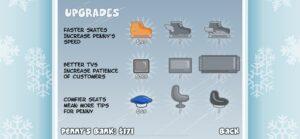I played Diner Dash Adventures and two comparable games, Penguin Diner, and Cooking Dash. Playing these games was interesting in that their mechanics (i.e., domestic tasks and servitude) don’t align with the conventional preferences and aspirations that society has defined for masculine personalities. This is not to say that the activities and themes in these games are/should be the aspiration for non-men. However, their existence expands the range of possibilities of what a game can be and playing them – as discussed in the reading – can shape a market for the coexistence of games that do and don’t cater towards conventional masculine preferences.
I also found elements in the games that aligned with the definition of feminist narratives that were discussed in the reading – i.e., games that allow “players to think within different perspectives and experiences”, games that enable agency, and games with stories that de-emphasize climactic building in favor of delving into narrative middle.
While Penguin Diner (and somewhat similarly Diner Dash Adventures) is technically building towards something in that the restaurant owner is building towards larger and larger restaurants, the progression towards some sort of apex isn’t the point. The player derives enjoyment from the intricacies of managing a day at their restaurant, and navigating the complexities and variety that are introduced with the addition of game mechanics and procedures (e.g., more customers with shorter tempers, new meals/combinations, and cooking equipment). At that point, the progression becomes more of a blip in the background, than a present goal to be building towards (outside of store enhancements that serve more as additional complications to work through).
There is also a lot of agency afforded through these games. Beyond finding ways to bring order to the chaos discussed in the reading in figuring out the order in which to prep, cook and serve meals, there is the additional element of making decisions on what shop upgrades to purchase and when best to purchase them. As a training mechanism for training a sense of agency and control, I think Penguin Diner and Cooking Dash are slightly less successful at this because of the way their mechanics are set up. In Penguin diner, the cost of individual upgrades is small relative to the money you make after each round so you can get everything easily, and there isn’t much choice. Similarly, Cooking Dash introduces a “recommended” purchase every now and then which I almost felt compelled to get because it felt like that would be the best option for me to do well in the game.







